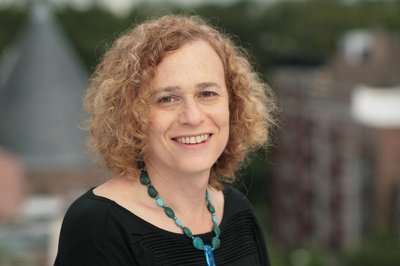Joy Ladin, a poet, professor and transwoman, will discuss the relationship between transgender and Judaism on June 8 at Temple Beth Zion-Beth Israel, 300 S. 18th St.
Ladin, who wrote a memoir about her transition called “Through the Door of Life,” is appearing as part of a new author series called “Sicha,” which means “conversation” in Hebrew. She will be joined by Nurit Shein, CEO of Mazzoni Center. The event is open to the public.
According to Shein, Ladin is an articulate interlocutor who is able to address a wide range of challenges confronting transgender individuals, including career, faith and parenthood. It is also notable that she transitioned during middle age.
“She represents a group of individuals who transitioned later on in life, as opposed to many of the patients that we see at Mazzoni Center,” Shein said. “Now that the world has changed and is more accepting, we see younger people transitioning. I think this is a story that hasn’t been told in many ways.”
Ladin, who teaches English at Yeshiva University, cheerfully admits that her life is complex.
A poet and scholar, she was already sensitive to nuances of language. Since transitioning, however, she has written less about poetry and more about the way trans identity illuminates human identity in general.
“In terms of what I do, my identity has become much more complicated since my transition, which is interesting,” Ladin said. “I thought of my gender transition as a way of resolving contradictions, internal contradictions with my identity, and of course my life became much more complicated.”
On a personal level, Ladin knows who she is. While acknowledging that there are multiple ways of being transgender, Ladin’s understanding of herself is straightforward.
“I am an old-fashioned, binary, male-to-female transsexual, so for me it’s a big deal to use female pronouns,” Ladin said. “My identity, the way that I live, is based on expressing my lifelong female gender identity.”
Ladin is clear, however, that she does not consider herself a woman.
As someone who transitioned after living for 45 years as a man, she said, it is not an identity she can claim.
“One of the things I’ve learned about through the transition process is that gender transition for me has not been a process of becoming a woman in any of the conventional senses of those words,” Ladin said. “Now I say, I used to live as a man I knew I wasn’t, and now I live as a woman I feel I am.”
Another important aspect of Ladin’s life is her Judaism. Although her parents were not particularly religious, as a child she was curious about her faith.
“I was drawn to Judaism from an early age, much more than my family was concerned with,” Ladin said. “I think part of the reason was that Judaism was the only thing that was part of my family’s lives that was as strange as I was. It’s this 3,000-year-old religion and it had nothing to do with the white, middle-class, not suburban but not so different than suburban lifestyle that we were living.”
Ladin acknowledges that her original understanding of the Torah was idiosyncratic, but it still informs her mature reflections on Judaism.
She describes her childhood connection to God as active and personal, something she claims is common among transgender children.
“For trans kids, this is often a very active dialogue,” Ladin said. “God is the one who made us the way we are and that feels like we were made wrong and God can and should fix it, so it’s quite an active relationship. And also, we tend to have grown up very lonely and so hanging out with God is a way of having a sense of companionship.”
Ladin now teaches at Yeshiva University, but that is purely coincidental.
What is significant, however, is the fact that she is by all estimates the only transgender person currently working at an Orthodox Jewish institution.
Since publishing her memoir in 2012, Ladin has frequently been invited to speak to Jewish audiences, something she welcomes. In her experience, congregants would like to initiate a thoughtful conversation about transgender issues, but they often lack the vocabulary.
“It’s easier to start those conversations, and really easier to have some of them, to ask certain kinds of questions, with people who are not part of your community, so nobody has to worry about devastating one of their members if they ask me a question and it’s not worded correctly,” she said.
Shein is optimistic about the impact Ladin will have on attendees.
“I hope that they will come away with a better awareness, understanding and compassion of the pain and the courage that it takes for people either to transition and for us to come out,” Shein said. “And that their hearts will be open to just seeing us, the LGBT community, as their fellow travelers on the journey of life.”
For more information, visit www.bzbi.org.
